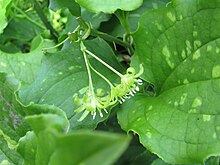Smilax tamnoides, common name bristly greenbrier,[2] is a North American species of plants native to the United States and Canada. It is widespread from Ontario and New York State south to Texas and Florida.[1][3]
| Bristly greenbrier | |
|---|---|

| |
| Scientific classification | |
| Kingdom: | Plantae |
| Clade: | Tracheophytes |
| Clade: | Angiosperms |
| Clade: | Monocots |
| Order: | Liliales |
| Family: | Smilacaceae |
| Genus: | Smilax |
| Species: | S. tamnoides
|
| Binomial name | |
| Smilax tamnoides L. 1753
| |
| Synonyms[1] | |
| |
The plant has been called Smilax hispida in many publications, but the name Smilax tamnoides is much older and under the botanical rules of priority it is the preferred name.
Smilax tamnoides is a climbing, prickly vine that supports itself on other vegetation. Flowers are green to brown, small but numerous in umbels; fruits blue to black without the waxy coating common on many other species of the genus.[4]
Conservation status in the United States
editIt is as a special concern species and believed extirpated in Connecticut.[5]
References
edit- ^ a b Kew World Checklist of Selected Plant Families
- ^ Virginia Tech, Department of Forest Resources and Environmental Conservation, bristly greenbrier Smilacaceae Smilax tamnoides Archived 2015-03-08 at the Wayback Machine
- ^ Biota of North America Program 2014 county distribution map, Smilax hispida, synonym of Smilax tamnoides
- ^ Flora of North America Vol. 26 Page 477 China root, hellfetter, bristly greenbrier Smilax tamnoides Linnaeus, Sp. Pl. 2: 1030. 1753.
- ^ "Connecticut's Endangered, Threatened and Special Concern Species 2015". State of Connecticut Department of Energy and Environmental Protection Bureau of Natural Resources. Retrieved 31 December 2017.(Note: This list is newer than the one used by plants.usda.gov and is more up-to-date.)
External links
edit- Illinois Wildflowers, Bristly Greenbrier Smilax hispida
- Lady Bird Johnson Wildflower Centerl University of Texas, Smilax tamnoides L. Bristly greenbrier
- Missouri Botanical Garden Plant Finder, Smilax hispida